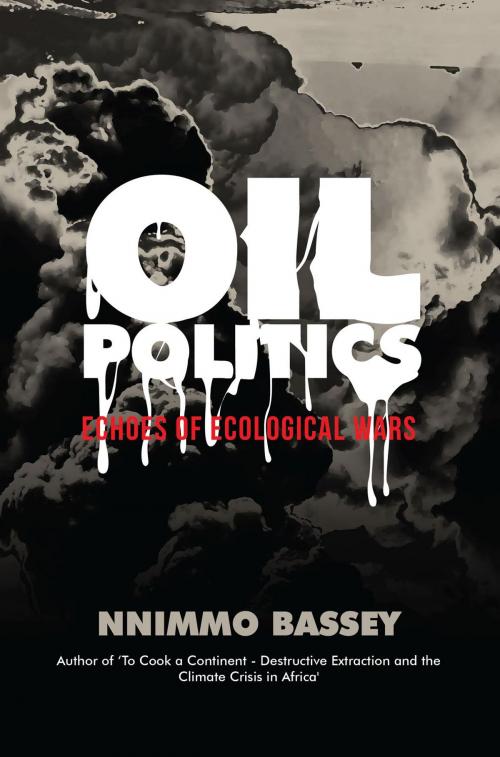Oil Politics
Echoes of Ecological Wars
Nonfiction, Science & Nature, Technology, Petroleum, Engineering, Environmental, Social & Cultural Studies, Political Science| Author: | Nnimmo Bassey | ISBN: | 9780995222342 |
| Publisher: | Daraja Press | Publication: | October 3, 2016 |
| Imprint: | Daraja Press | Language: | English |
| Author: | Nnimmo Bassey |
| ISBN: | 9780995222342 |
| Publisher: | Daraja Press |
| Publication: | October 3, 2016 |
| Imprint: | Daraja Press |
| Language: | English |
The essays here contribute to developing and deepening an understanding of the ecological challenges ravaging Nigeria, Africa and our world today. They illustrate the global nature of these terrors. These essays are not meant just to enable for coffee table chatter: they are intended as calls to action, as a means of encouraging others facing similar threats to share their experiences.
Set out in seven sections, this book of 54 essays deals with deep ecological changes taking place primarily in Nigeria but with clear linkages to changes elsewhere in the world. The essays are laid out with an undergird of concerns that characterise the author’s approach to human rights and environmental justice advocacy. The first section rightly presents broad spectrum ecological wars manifesting through disappearing trees, spreading desertification, floods, gas flaring and false climate solutions.
The second section zeroes in on the different types of violence that pervade the oil fields of the Niger Delta and draws out the divisive power of crude oil by holding up Sudan as a country divided by oil and which has created a myriad of fissures in Nigeria. The exploitation of crude oil sucks not just the crude, it also sucks the dignity of workers that must work at the most polluting fronts.
Section three underscores the need for strict regulation of the fossil fuels sector and shows that voluntary transparency templates adopted by transnational oil companies are mere foils to fool the gullible and are exercises in futility as the profit driven corporations would do anything to ensure that their balance sheets please their top guns and shareholders. The fourth section builds up with examples of gross environmental misbehaviours that leave sorrow and blood in a diversity of communities ranging from Chile to Brazil and the United States of America.
Section five of the book is like a wedge in between layers of ecological disasters and extractive opacity. It takes a look at the socio-political malaise of Nigeria, closing with an acerbic look at crude-propelled despotism and philanthropic tokens erected as payment for indulgence or as some sort of pollution offsets.
The closing sections provide excellent analyses of the gaps and contortions in the regulatory regimes in Nigeria. It would be surprising if these were not met with resistance on the ground.
These essays provide insights into the background to the horrific ecological manifestations that dot the Nigerian environment and the ecological cancers spreading in the world. They underscore the fact there are no one-issue struggles. Working in a context where analyses of ecological matters is not the norm, decades of consistent environmental activism has placed the writer in good stead to unlock the webs that promote these scandalous realities.
The essays here contribute to developing and deepening an understanding of the ecological challenges ravaging Nigeria, Africa and our world today. They illustrate the global nature of these terrors. These essays are not meant just to enable for coffee table chatter: they are intended as calls to action, as a means of encouraging others facing similar threats to share their experiences.
Set out in seven sections, this book of 54 essays deals with deep ecological changes taking place primarily in Nigeria but with clear linkages to changes elsewhere in the world. The essays are laid out with an undergird of concerns that characterise the author’s approach to human rights and environmental justice advocacy. The first section rightly presents broad spectrum ecological wars manifesting through disappearing trees, spreading desertification, floods, gas flaring and false climate solutions.
The second section zeroes in on the different types of violence that pervade the oil fields of the Niger Delta and draws out the divisive power of crude oil by holding up Sudan as a country divided by oil and which has created a myriad of fissures in Nigeria. The exploitation of crude oil sucks not just the crude, it also sucks the dignity of workers that must work at the most polluting fronts.
Section three underscores the need for strict regulation of the fossil fuels sector and shows that voluntary transparency templates adopted by transnational oil companies are mere foils to fool the gullible and are exercises in futility as the profit driven corporations would do anything to ensure that their balance sheets please their top guns and shareholders. The fourth section builds up with examples of gross environmental misbehaviours that leave sorrow and blood in a diversity of communities ranging from Chile to Brazil and the United States of America.
Section five of the book is like a wedge in between layers of ecological disasters and extractive opacity. It takes a look at the socio-political malaise of Nigeria, closing with an acerbic look at crude-propelled despotism and philanthropic tokens erected as payment for indulgence or as some sort of pollution offsets.
The closing sections provide excellent analyses of the gaps and contortions in the regulatory regimes in Nigeria. It would be surprising if these were not met with resistance on the ground.
These essays provide insights into the background to the horrific ecological manifestations that dot the Nigerian environment and the ecological cancers spreading in the world. They underscore the fact there are no one-issue struggles. Working in a context where analyses of ecological matters is not the norm, decades of consistent environmental activism has placed the writer in good stead to unlock the webs that promote these scandalous realities.















